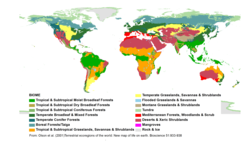Part 4: Biome Study
Guiding Questions: 
- If habitat suitability is expected to change for some abundant species, then how will the biome shift with climate change?
- When comparing my selected biome to another global biome, is the degree of change in future temperature and precipitation similar or different?
Definitions:
- Tree Species Composition = the variety of trees in a given area.
- Community = a group of species
that occur together in a particular area.
- Ecosystem = a community plus its physical surroundings.
- Biome = a major ecological
community that extends
over a large geographic area characterized by an abundant
type of vegetation. The organisms of a biome are adapted to
the climate conditions associated with the region.
Materials (one per group):
- Computer with Internet access
- Biome Maps
- Biome Slideshow

- Biome Climate Investigation document
- Planning Guide for Scientific Research
Estimated
Time:
- 1 hour
What to do and how to do it:
- INTRODUCTION:
Review background and prior knowledge of biomes (ie. KWL or KLEW, concept mapping). Look at
example images in the Biome Slideshow.
- Students individually use the prompts on the Biome Climate Investigation handout (structured inquiry option) or their science notebooks (guided inquiry option) to predict how their local biome will be impacted by climate change. (Biome Global Map Available).
- Instructor provides or students identify a new question concerning the local biome and anticipated climate change (see guiding questions above).
- Brief overview of biome tools introduced.
- Printable Biome Map
- Interactive Biome Map (on the Carbon
Mapper tool under the GLOBE Carbon Cycle Data Group)
- Biome Map with Selected Climate Data
- Climate Change Comparisons (on Single Site Climate Data page)
- The structured inquiry option instructs sudents use the Biome Map with Selected Climate Data and other resources to investigate the guiding questions.
- WRAP-UP:
Students discuss with a partner the findings. Consider if the
tools provided help to answer the question they posed. What are some
remaining research questions?
- Consider using the Planning Guide for Scientific Research to develop a new investigation.
